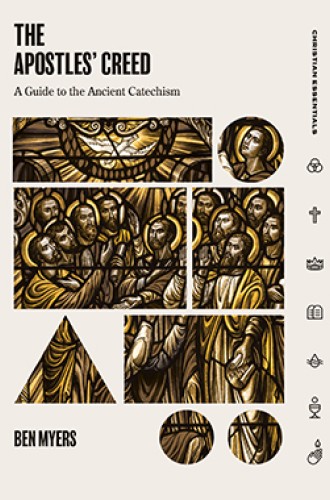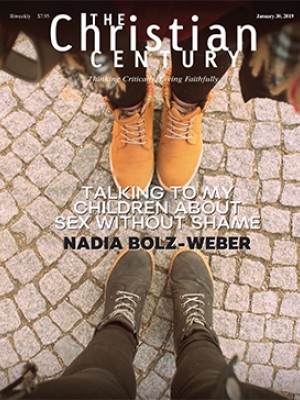Loving the creed, loving God
Ben Myers is a great teacher. His book left me fascinated not with him but with God.
It is said that there are two types of conversationalists. One leaves you thinking how interesting they are; the other leaves you thinking how interesting you are. The trick to being a good conversationalist is to be the second sort. So too, I think, with teachers. One sort of teacher leaves you thinking how smart they are. The other leaves you thinking how smart you are—or more accurately, how much more you now know about a topic.
By this standard, Ben Myers is a great teacher. I finished his book on the Apostles’ Creed fascinated not with him but with the God revealed in scripture—so fascinated that I wanted to teach others what I’d learned. This is the perfect book for a class of newcomers to church, antagonists of the faith, or longtime believers. It fits well in a college or seminary classroom, on your grandmother’s bedside table, or in your teenager’s reading app.
Read our latest issue or browse back issues.
This small book was originally a series of sermons preached by Myers (who is Anglican) at a congregation belonging to the Uniting Church in Australia. “The sermons were long, and the book is short,” he writes. Hemingway could be proud of a sentence that unostentatious and punchy. Myers never says more than he needs to, nor does he get bogged down in academic fights. He points to God, and he manages to get us to look not at his finger but in the direction it points.
For example, in his discussion of the “holy catholic church,” Myers names all of the divisions of gender, race, and class that baptism is meant to wash away. Then, as he slides into the “communion of the saints,” he notes that there is a greater barrier than any of those: death. The division between the living and the dead is more unsurpassable than any other. Yet Jesus makes one new people consisting of both. “The church is salvation,” he says in a sentence reminiscent of Stanley Hauerwas. (I would be tempted to defend such acclaim with a long digression, or at least add a lengthy footnote. None is forthcoming. Myers then sounds a note that reflects the influence of Rowan Williams. The faith we hold is simply the faith of Jesus, he says. We are washed with his same bath, fed with his same meal. I hadn’t heard this point made precisely like that before, informed by scholarship but not imprisoned by it, and with brilliant understatement.
Myers is best known for his blog, Faith and Theology, which closed up shop earlier this summer, though he remains an active Twitter presence. He speaks of himself as a high Anglican, but he travels well both in mainline settings and among evangelicals. (This book leads off a series that will feature books by Peter Leithart and Wesley Hill.) In short, Myers is hard to pin down on a liberal-conservative grid. He does not seem defensive as he unpacks “God the Father.” He simply notes patristic sources that insist that this does not mean God is a male. The church fathers’ rationale was not a feminist one but rather grew out of an opposition to flighty pagan humanlike gods, who could fly off the handle and were anything but reliable. Myers then reads the word almighty as a claim about God’s trustworthiness.
In both cases, some readers will want more pushback. Such pushback might come from those with feminist concerns or from those who worry that an “almighty” God is one who acts like a meddler in human affairs. Myers is aware of those concerns, but rather than play defense he pivots to something brilliant. We confess God as Father because of Jesus, whose relationship to God is “unique but also inclusive.” I have rambled forever in lectures and sermons trying to make that point, which Myers makes in four words. He later asks: Who could trust a God who is “not the world’s sustainer but its invader”? Seven words this time, but again, remarkable restraint.
In each article of the creed, Myers finds treasures old and new. When we say the Apostles’ Creed, he writes, “we confess the three great movements of God’s power: God lovingly brought the world into being; God lovingly entered the womb and became part of the world in Jesus Christ; and God the Holy Spirit is lovingly transfiguring the world in the lives of the saints.”
Myers notes in passing the common criticism that the ancient creeds were imposed by an imperial authority to exclude rival forms of Christianity or claimants to political power. There may be some truth to this critique when it comes to the Nicene Creed. But regarding this old Roman baptismal creed, Myers writes, “nothing could be farther from the truth.” The Apostles’ Creed is, instead, “an indigenous form of the ancient church’s response to the risen Christ.”
Myers’s book is short; the creed is shorter still. Both are public, and neither contains advanced or exclusive teaching. Scripture, the Apostles’ Creed, and Christian faith are out in the open—and we never advance beyond them. As Myers puts it, “the Christian faith is mysterious not because it is so complicated but because it is so simple.” So it is with this book that loves the creed: it points to God, and it makes me long to love God more too.
A version of this article appears in the print edition under the title “Old creed, new treasures.”







